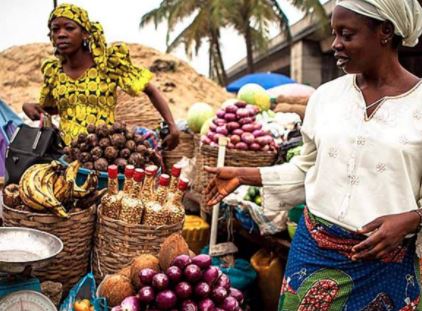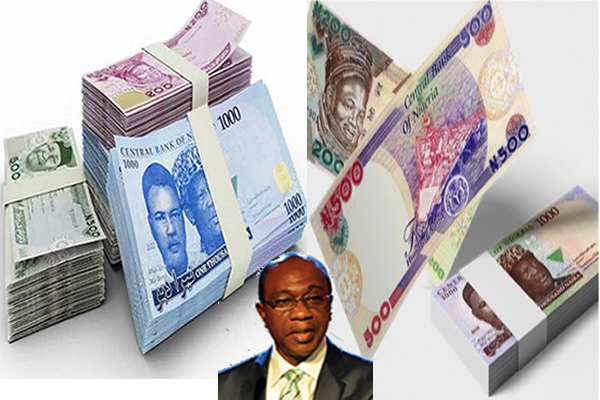“I went to the ATM this morning to withdraw, no money. So I decided to use the banking hall and after queuing up for over 30 minutes, the bank attendant said they can only give N2, 000 in N50 denomination. I angrily walked out of the bank,” a resident of Lagos, Ijeoma Igwe lamented.
Another disappointed bank holder Godwin Enakhena, said: “I have been to six banks within Ikeja trying to use an atm but none is dispensing cash. I went into each of these banks but they’re not paying anyone. Their reason is that they don’t have the new notes and are not allowed to pay with the old notes”.
On February 25, Nigerians will elect a new leader that will succeed President Muhammadu Buhari, but the main concern for the average citizen today is getting money to solve their daily needs as the effect of the naira redesign and cash swap programme embarked upon by the Central Bank of Nigeria (CBN) has left many desperate and grounded business activities.
The naira redesign is believed to be targeted at stopping vote buying in the 2023 general election scheduled for February 25 and March 11, while the cash swap programme which is being implemented across the country in partnership with super agents and commercial banks also referred to as deposit money banks (DMBs), was developed to facilitate the circulation of the new naira notes, especially in unbanked communities.
“Agents may, on request, instantly open a wallet or account, leveraging the CBN Tiered Know-Your-Customer KYC Framework. This will ensure that this category of the populace are able to exchange or deposit their cash seamlessly without taking unnecessary risk or incurring undue cost,” the CBN said.
However, even in major cities such as Abuja, Lagos and Port-Harcourt, many bank account holders are finding it extremely difficult to access cash and some have also reported service failure while making digital transactions using some bank applications, leaving them completely stranded.
Many account holders with Zenith Bank say for more than three consecutive days, they have been unable to make withdrawals from their debit cards or mobile transactions using the bank’s app, leading to anger and frustration for many.
Aminu Hassan tweeting with the handle @AminuHa92948434 wrote: “The network problem I’m facing with my zenith bank acct is beyond imagination, imagine for good three days I can’t transfer money in to someone’s acct???”
Another account holder simply identified as Madox, has also called out the bank for making authorized deduction from his domiciliary account on Tuesday when he did not initiate any transaction.
“I noticed that a total of $11.031 (about N5,060, 000 at the official rate and N8, 305, 000 at the black market exchange rate) was missing from my Domiciliary account. The money is showing in my ledger balance but it’s not showing in my account balance,” he said, adding that when he contacted the bank, he was told that someone had made fraudulent transactions with his account.
New Cash Limits Undermine Existing Law – Falana
Reports monitored across the country also indicate that many commercial banks either outrightly shutting their gates against customers or have limited the amount of cash they can access to between N1, 000 – N5, 000 per day.
The banks insist they have very limited or no cash to give to customers and for a country seeking to increase public trust towards banking system, some analysts have said the current situation can cause people to move away from banking as these institutions which run on the deposits of people were now acting contrary to its nature and objective existence.
After initially denying the naira scarcity, the CBN has threatened to impose stiff sanctions any financial institution found to be hoarding the new naira notes.
Director of the Payment System Management Department Musa Jimoh, stressed that the CBN had “massively supplied” the new notes to banks to dispense both at counters and Automated Teller Machines (ATMs).
However, Human rights advocate Femi Falana, faulted the CBN’s new cash withdrawal policy that limits over-the-counter cash withdrawals by individuals and corporate entities to N100,000 and N500,000, respectively weekly.
Falana said citizens have the option to withdraw money upon demand to the tune of N5 million and N10 million for individuals and corporate entities respectively, according to section 2 of the money laundering act, 2022.
The section of the act states: “(1) No person or body corporate shall, except in a transaction through a financial institution, make or accept cash payment of a sum exceeding—(a) N5,000,000 or its equivalent, in the case of an individual; or (b) N10,000,000 or its equivalent, in the case of a body corporate.”
The lawyer explained: “Since the money laundering act has not been amended, the limitation of cash withdrawal of not more than N20,000 per day and N100,000 per week fixed by the Central Bank of Nigeria is illegal, null and void in every material,” Falana said.
POS Operators Gain from Naira Racketeering
Meanwhile, while commercial banks claim not to have sufficient cash to meet demand, operators of Point-of-Sale Machine (POS) have more than enough cash to give but charge a service fee of 10 per cent of the requested amount, a development many Nigerians describe as extortion and robbery.
A POS operator in Yaba, Lagos state, Asmau Oladimeji, said she buys the naira and in order to get return on her investment, she has raised her service fee from two per cent to 10 per cent. She however, refused to name the vendor from whom she buys the naira.
For example, the cost of withdrawing N10, 000 which used to be N200 is now N1, 000 and N20, 000 which previously attracted a fee of between N300-N400 naira now costs N2, 000. This fee applies to not only new banknotes, but including the old N1, 000, N500 and N200 notes which would cease to be legal tenders by February 10.
An unauthorised agent Oluwadarasimi Emma was arrested Wednesday by officials of the Independent Corrupt Practices and other related offences Commission (ICPC), for offering the newly-introduced currency notes for sale online.
Emma, a dealer skincare products and other travel services was detained for allegedly selling the new naira notes to the public via a microblogging platform, according to a statement by ICPC’s spokesperson, Azuka Ogugwa.
The anti-corruption agency said it believed the suspect colluded with key elements in the financial services sector to divert the newly-introduced currency notes to the “black market”.
The Department of State Services, DSS, also arrested some members of an organised syndicate selling the new naira notes in parts of the country on Monday, and indicted some commercial bank officials reportedly aiding and abetting the act.
However, despite the high service charge, POS operators currently remain the main source for cash withdrawals up to a daily limit of N20, 000.
SMEs Suffer as Naira Scarcity Grounds Businesses
Small and Medium Enterprises (SMEs) and entrepreneurs which play a significant role in driving innovation and growth in all economies, have been worse hit by the naira scarcity and have received a double shock.
Many have reported decline in the demand for goods and services partly due to the lack of access to cash by the spending public, service failure experienced during electronic transfers and the unwillingness of business owners to accept the old notes for transactions.
There has also reportedly been increased lateness and low turnout at the workplace as some staff find it more convenient to operate from home in view of the cash crisis, the only snag being that they would also have to grapple with the challenge of epileptic power supply.
Reacting to the situation, a businesswoman Racheal Ajani, said: “It is rather unfortunate that now banks seem to be neither that place where people can keep their money safe nor the service provider who operates with the motive of benefiting and serving common people.”

